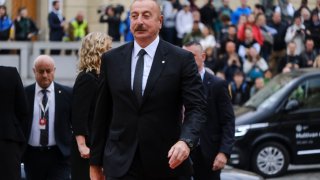The World has the Chance to Hold Azerbaijan Accountable
The COP29 summit may be the last opportunity for the international community to condemn President Ilham Aliyev and prevent the total erasure of Nagorno-Karabakh’s population.
A year ago, Azerbaijani forces launched a brutal military operation in Nagorno-Karabakh that, within days, expelled a population of 120,000 ethnic Armenians who had called the region home for millennia. Besides issuing a few perfunctory statements, the international community did nothing to hold Azerbaijan to account. Now, it has a unique chance to make amends.
From November 11-22, Azerbaijan will host the UN Climate Change Conference, or COP29, the most important gathering of world leaders to address climate change. While Azerbaijan will use the conference to try to polish its image and showcase itself as a leader in the region, the human rights community sees an opportunity to finally shine a spotlight on Azerbaijan’s extraordinarily odious regime, which continues to project aggression toward Armenia and abuse its own people.
COP29 can serve as a forum for state participants to pressure Azerbaijan to cease its abuses and also propose a concrete path for the multitudes who were banished from their homeland.
Unfamiliar to much of the world, Nagorno-Karabakh is a disputed territory in the South Caucasus situated roughly between Armenia and Azerbaijan. Though internationally recognized as part of Azerbaijan based on Soviet-era demarcations, the area was independently governed by its indigenous ethnic Armenian population during and following Soviet rule.
In September 2020, Azerbaijan launched a forty-four-day war and took control of part of the autonomous enclave. The land grab was ruthless. Azerbaijani forces decimated villages, tortured prisoners, and beheaded those who were too sick or elderly to escape. A ceasefire was called, but Azerbaijan’s brutality did not subside.
We at the University Network for Human Rights (UNHR) have spent the past four years investigating these and other abuses that led to last year’s ethnic cleansing. Our team from Harvard, Oxford, UCLA, Wesleyan, and Yale has conducted seven fact-finding missions in Armenia and Nagorno-Karabakh, the most recent taking place this past month. We recently published a 200-page report on the atrocities we investigated, including excessive torture, killings, disappearances, the mutilation of corpses, and the destruction of churches and cemeteries.
These abuses form part of Azerbaijan’s broader campaign to exterminate Nagorno-Karabakh’s indigenous population, a policy openly touted by its leadership time and time again. Azerbaijan’s dictator Ilham Aliyev refers to Armenians as “rats,” “dogs,” and “barbarians” infected with a “virus” for which they “need to be treated.” He has repeatedly warned, “If [Armenians] do not want to die, then get out of Azerbaijani lands,” which he considers to include Nagorno-Karabakh and even Yerevan, Armenia’s capital. Azerbaijani officials echo his genocidal discourse, calling ethnic Armenians a “cancerous tumor” and “disease” and declaring, “Our goal is the complete elimination of Armenians.” Aliyev’s government even issued a stamp with a soldier in a hazmat suit fumigating Nagorno-Karabakh.
In the weeks leading up to last year’s ethnic cleansing, I met with U.S. officials to warn of the impending expulsion. UNHR also published a briefing paper about the risk of genocide in the region. Other genocide experts also sounded the alarm; the first chief prosecutor of the International Criminal Court, the first UN Special Advisor on the Prevention of Genocide, Genocide Watch, and the Lemkin Institute for Genocide Prevention all issued separate warnings of the genocidal nature of Azerbaijan’s actions.
Sadly, our alerts were ignored, and on September 19 last year, Azerbaijan struck. The result has been devastating. Nagorno-Karabakh is currently the least free location on the planet, according to Freedom House, topping places like Syria, North Korea, and Eastern Ukraine.
Weeks after Freedom House released its report, Aliyev broadcast from Nagorno-Karabakh’s emptied capital to praise the demolition of “the devil’s nest,” Nagorno-Karabakh’s parliament, and boast that there was “no longer any trace” of ethnic Armenians, whom he called “separatists.” He then lit a fire to symbolize what he dubbed “the final cleaning.”
While Aliyev dismisses condemnation by organizations like Freedom House or UNHR, he does care about his status among world leaders, particularly in Europe, which is the primary purchaser of Azeribaijan’s fossil fuels. Oil and gas production accounts for 92.5 percent of Azerbaijan’s export revenue, so Aliyev’s political survival hinges on his reputation in fora like COP29.
Many were shocked by the announcement that a brutal petrostate like Azerbaijan would host the climate change conference, a decision made only weeks after the ethnic cleansing was carried out. Climate champion Greta Thunberg, for instance, lamented that the summit “is being held by an authoritarian regime which violates human rights both within the country and not least against Armenians, and which depends on dirty fossil fuels for export and desperately tries to repress voices that strive for change.”
But the conference may be the last opportunity for the international community to condemn Azerbaijan and prevent the total erasure of Nagorno-Karabakh’s population. Those who fled should be allowed to go back—or receive significant compensation.
The international community has a rare chance at redemption. How will it respond?
Thomas Becker is the Legal and Policy Director at the University Network for Human Rights. He teaches human rights at Columbia Law School and Wesleyan University.
Image: Shutterstock.com.

